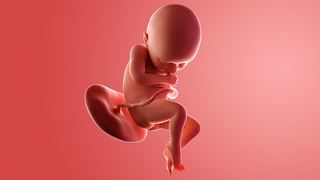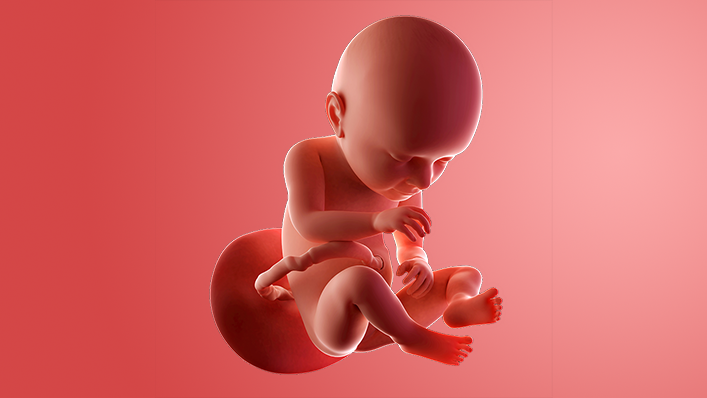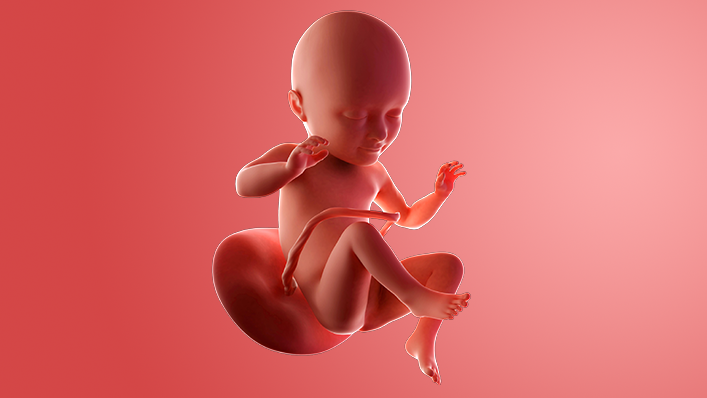- Week 28
- Week 29
- Week 30
- Week 31
- Week 32
- Week 33
- Week 34
- Week 35
- Week 36
- Week 37
- Week 38
- Week 39
- Week 40
- Week 41
Week 35
Many women choose to begin their maternity leave around now, and then use the next few weeks to prepare for the baby's arrival. Others prefer to work until the birth.
Do what feels right for you.
What's happening in my body?
If you've spotted any yellow stains in your bra, then that's probably colostrum, which is an early milk that is rich in antibodies.
Some pregnant women start to make it weeks or even months before the birth. When you breastfeed, this helps to protect your baby from stomach bugs and other infections.
Around 3 to 5 days after the birth, your milk will come in, and your breasts will look even bigger.
You may wish to get ready for this by getting measured for a feeding bra that will allow a bit of growth. You could also stock up on breast pads to soak up any extra milk, so that you don't stain your clothes.
Not everyone can breastfeed, and it takes a bit of practice, but if you can, then it gives your baby a good start in life.
Group B strep
Group B strep is a common bacteria and up to 2 in 5 people have it living in their body.
If you carry group B strep while you're pregnant, there's a small risk it could make your baby seriously ill. Most group B strep infections in newborn babies are preventable.
For more information talk to your midwife, or visit the Group B Strep Support website.
Your pain management options for labour
There are lots of effective ways for managing pain during childbirth.
You do not need to pick just one of them. You could start with one and then move on to another.
Have a look at where to give birth and your options on the NHS website.
Discuss your ideas with your midwife, doctor and partner. Then write your preferences in your birth plan. Remember – you can change your mind on the day.
3rd trimester pregnancy symptoms (at 35 weeks)
You may be getting sore ribs now. That could be because your baby is head down, and kicking away.
If the pain is really bad, or under your ribs, then talk to your midwife or doctor, just in case it's a sign of a condition called pre-eclampsia. However, it's more likely that your little one is just very active.
Your signs of pregnancy could also include:
- painless contractions around your bump, known as Braxton Hicks contractions
- sleeping problems (week 19 has information about feeling tired)
- stretch marks (week 17 has information on stretch marks)
- swollen and bleeding gums (week 13 has information on gum health during pregnancy)
- pains on the side of your baby bump, caused by your expanding womb ("round ligament pains")
- piles (week 22 has information on piles)
- headaches (read about headaches in pregnancy on NHS.uk)
- backache
- indigestion and heartburn (week 25 has information on digestive problems)
- bloating and constipation (week 10 has information on bloating)
- leg cramps (week 20 has information on how to deal with cramp)
- feeling hot
- dizziness
- swollen hands and feet
- urine infections
- vaginal infections (week 15 has information on vaginal health)
- darkened skin on your face or brown patches – this is known as chloasma or the "mask of pregnancy"
- greasier, spotty skin
- thicker and shinier hair
You may also experience symptoms from earlier weeks, such as:
- mood swings (week 8 has information on mood swings)
- morning sickness (week 6 has information on dealing with morning sickness)
- weird pregnancy cravings (week 5 has information on pregnancy cravings)
- a heightened sense of smell
- sore or leaky breasts (week 14 has information on breast pain) – a white milky pregnancy discharge from your vagina and light spotting (seek medical advice for any bleeding)
RSV vaccination
Have you had the RSV (respiratory syncytial virus) vaccine? It's usually offered at around week 28 but can be given later if needed, right up until you go into labour.
Having the vaccination can lower your baby's risk of a severe lung infection called bronchiolitis, which can make it difficult for your baby to breathe and feed. If you've not had it yet, speak to your midwife or a GP.
What does my baby look like?
Your baby is around 46.2cm long from head to heel. That's approximately the size of a honeydew melon.
Your baby is getting chubbier, which will help them to stay at the right temperature when they're born.
It's getting rather cramped in your womb now, but your baby should still be moving around, and you should feel movements as strongly and regularly as you have done in previous weeks.
If the movements change or stop, then talk to your doctor, midwife or call NHS 111.

Action stations
Have you had the whooping cough jab yet? It's usually offered to pregnant women between 16 and 32 weeks – but it's not too late to have it now.
This vaccine will protect your tiny baby from this dangerous disease for the first few weeks of their life.
If you haven't already, talk to your midwife or doctor about the jab.
This week you could also...
More in week-by-week

Week 36
You'll have an antenatal appointment around now with your doctor or midwife.
More in week-by-week guide to pregnancy


